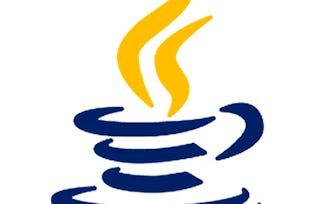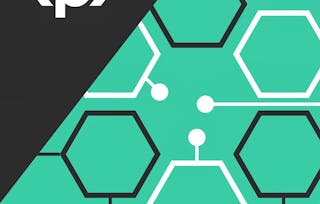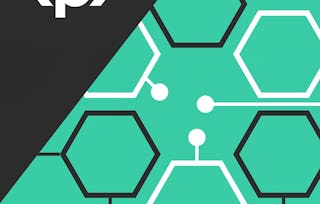This course provides an introduction to the Java language and object-oriented programming, including an overview of Java syntax and how it differs from a language like Python. Students will learn how to write custom Java classes and methods, and how to test their code using unit testing and test-driven development. Topics include basic data structures like Arrays and ArrayLists and overloading methods.

Introduction to Java and Object-Oriented Programming

Introduction to Java and Object-Oriented Programming
This course is part of Introduction to Programming with Python and Java Specialization

Instructor: Brandon Krakowsky
42,180 already enrolled
Included with
332 reviews
Recommended experience
What you'll learn
Identify core aspects of object-oriented programming and features of the Java language.
Use Eclipse for writing and running Java code.
Develop programs that use Java collections and apply core object-oriented programming concepts using classes, polymorphism, and method overloading.
Test code by applying principles of test-driven development using Java's unit testing framework.
Skills you'll gain
Details to know

Add to your LinkedIn profile
7 assignments
See how employees at top companies are mastering in-demand skills

Build your subject-matter expertise
- Learn new concepts from industry experts
- Gain a foundational understanding of a subject or tool
- Develop job-relevant skills with hands-on projects
- Earn a shareable career certificate

There are 3 modules in this course
Welcome to Java! This first module provides an introduction to the Java language and object-oriented programming. It includes an overview of Java syntax, in particular, how it differs from a language like Python. Topics will include variables and data types, loops and conditionals, printing to the console, scanning for user input, and code documentation. This module also explains the structure and inner-workings of a Java class and teaches you how to define your own custom classes and methods.
What's included
38 videos10 readings3 assignments2 app items
In this module, you will be taught to test your code to get it working. The best way to do this is to write a set of unit tests that you can run against your program, at any time. In this module, we'll learn how to do unit testing in Java, and why we want to do it. We’ll also learn all about Java Arrays, which are collections of items, and ArrayLists, which are kind of like arrays, but much more flexible. These work just like lists in Python. ArrayLists are part of Java’s larger Collections Framework, which we’ll continue to reference throughout this course.
What's included
23 videos5 readings2 assignments2 app items
So far, we’ve been defining variables as instance variables in our Java classes. Instance variables are just variables defined inside a class, and every instance of a class can have a different value for an instance variable. In this module, we’ll look at defining static variables in our Java classes. Static variables are also defined as variables inside a class, but with the keyword 'static'. Static variables have the same value for every instance of a class. In fact, you don’t even need to create an instance of a class to use a static variable! We’ll also look at static methods. And just like static variables, you don’t need to create an instance of a class to use, or call, a static method. In this module, we’re also going to introduce polymorphism, which refers to overloading and overriding. We’ll focus on overloading, which is having two or more methods in the same class, with the same name.
What's included
21 videos2 readings2 assignments1 app item
Earn a career certificate
Add this credential to your LinkedIn profile, resume, or CV. Share it on social media and in your performance review.
Instructor

Offered by
Explore more from Software Development
 Status: Free Trial
Status: Free Trial Status: Free Trial
Status: Free Trial Status: Free Trial
Status: Free Trial
Birla Institute of Technology & Science, Pilani
Why people choose Coursera for their career

Felipe M.

Jennifer J.

Larry W.

Chaitanya A.
Learner reviews
- 5 stars
67.77%
- 4 stars
21.08%
- 3 stars
5.42%
- 2 stars
1.80%
- 1 star
3.91%
Showing 3 of 332
Reviewed on Jun 26, 2023
The lecturer was excellent. his teaching style is very smart and understanable to everyone,and explanation part is also great. wish to learn from him again.
Reviewed on Nov 2, 2022
Amazing course and really , really usefull for professional coding , thank you so much for providing me financial aid really loved the experience
Reviewed on May 28, 2022
A 10 out of 10 course. Very well designed and the assignments are great for enhancing learning and understanding.

Open new doors with Coursera Plus
Unlimited access to 10,000+ world-class courses, hands-on projects, and job-ready certificate programs - all included in your subscription
Advance your career with an online degree
Earn a degree from world-class universities - 100% online
Join over 3,400 global companies that choose Coursera for Business
Upskill your employees to excel in the digital economy
Frequently asked questions
The only math that learners will need for this Specialization is arithmetic and basic concepts in logic.
If you enjoyed this course, we recommend Courses 1, 2 and 4 in the series!
If you would like to learn the fundamentals of computer science beyond the basics of programming, consider applying to the Master of Computer and Information and Technology (MCIT) at the University of Pennsylvania, an Ivy League computer science master’s program for people without a computer science background. For an on-campus experience, explore here. If you prefer an online setting, apply to MCIT Online. In fact, the lectures in this series are also used in the online degree program! The Specialization certificate will be viewed favorably by the admissions committee, so be sure to mention it when you apply.
To access the course materials, assignments and to earn a Certificate, you will need to purchase the Certificate experience when you enroll in a course. You can try a Free Trial instead, or apply for Financial Aid. The course may offer 'Full Course, No Certificate' instead. This option lets you see all course materials, submit required assessments, and get a final grade. This also means that you will not be able to purchase a Certificate experience.
More questions
Financial aid available,

